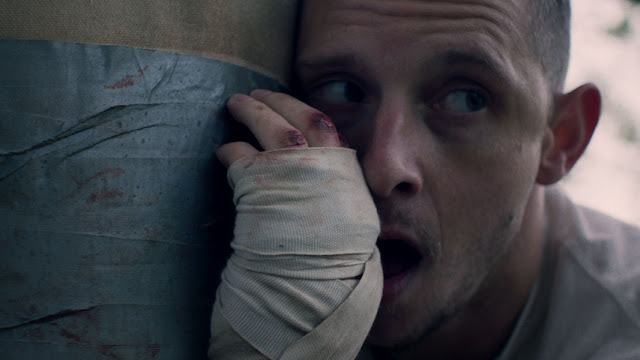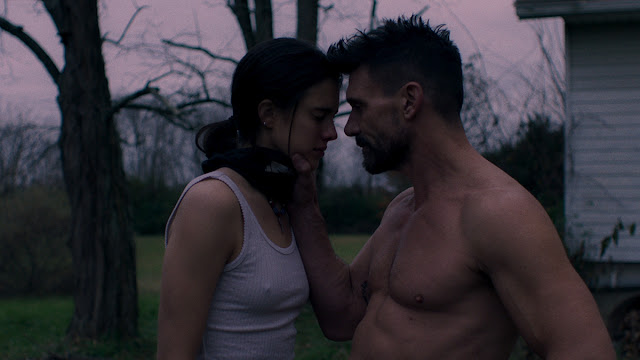Holy hell, Donnybrook is bleak. A movie about a down-on-his-luck former soldier and a vicious drug dealer competing for $100,000 in an underground bare-knuckle melee already sounds grim, but damn.
Based on Frank Bill’s novel of the same name, Donnybrook follows Jarhead Earl (Jamie Bell) as he tries to make his way to the titular brawl, hunting for a life-changing payday for his family. A feat complicated by Chainsaw Angus (Frank Grillo), a brutal meth dealer, and his sister, Delia (Margaret Qualley). They meet and clash throughout their desolate rust belt environment that seems to be why the word hardscrabble was invented.
These are hard-luck men in a hard-luck place, pushed to extremes by crushing desperation. Both Jarhead and Angus are stoic and near-silent, speaking more with sudden eruptions of violence than with words—when they choose to use their fists says far more than their mouths ever do.
Bell’s stone-faced exterior masks the drive only living on the brink of annihilation can create, allowing just hints and cracks of raw, rugged pain to show through. Grillo is no stranger to playing tough guys, but Angus is brutal in ways we’ve never seen, which makes him all the more terrifying and sinister as he blinks from cold and blank to ferocious and sadistic. Qualley’s Delia is damaged in deep, cavernous ways, and quietly trying to claw herself back together, somehow, some way.
These are broken people, their aches and injuries writ large. We don’t get a ton of specifics about the hows and whys of their various traumas. The script infers, letting us wonder and imagine, but between the gritty performances and the rugged forces that mold these characters, it’s a palpable and visceral sensation. We don’t need the precise details to know their lingering agony and long, intertwined histories.
Their intersecting paths, doomed heroic journey, ultimate futility, and sick twist of fate, give Donnybrook an air of Greek tragedy. Elements like a river guide, the entrance fee into the underworld, and a soaring score that uses classical music and operatic tracks—mixed with droning synths and frantic heavy metal—enhance this scope and aesthetic.
The gradual, deliberate pace isn’t be for everyone, though it furthers the morose tone and omnipresent foreboding. At times the momentum flags and Donnybrook spins its narrative wheels. For the most part, the threads with Jar and Angus have a propulsive force behind them, but elements like James Badge Dale’s drunk, drug-addled cop, Whalen, don’t go anywhere or fully develop. Whalen's presence makes the case that there’s much more in the book that didn’t make the transition from page to screen.
Even visually, Donnybrook is dejected and unrelenting. Director Tim Sutton (Dark Knight) and cinematographer David Ungaro (A Prayer Before Dawn) film everything in gloomy tones, from the deep blues that give exterior shots the sensation of melancholy, overcast days, to dimly lit dive bar interiors that appear as hopeless as dimly lit dive bars often are. The camera lingers on brutalized faces, roughed up by fists, drugs, and life, never shying away from scars and wounds. With everything else, they paint a dour portrait of a place and people barely hanging on. We know where the plot is heading—to the Donnybrook—but Sutton and Ungaro deliver a startling, chaotic all-out brawl that’s frenetic and stressful and hits in primitive places.
Some viewers will be put off by Donnybrook’s relentless misery and abject despair—there’s not a glint of hope to find, even in the devastating final moment. But it’s a primal cry, an injury that won’t heal, and a weighty, powerful look at the underbelly of America’s decaying heartland. [Grade: B+]






No comments:
Post a Comment